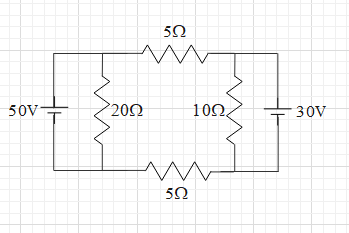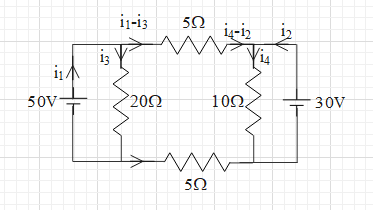Question
Question: In the circuit shown, current (in A) through the 50V and 30V batteries are, respectively :  through the 50V and 30V batteries are, respectively :

A. 3.5 and 2
B. 3 and 2.5
C. 2.5 and 3
D. 4.5 and 1
Solution
Find the currents through the resistances of 20Ω and 10Ω by using Ohm’s law. Then use junction law at points C and A and find the currents through both the 5Ω resistances in terms of current through battery 50V. Then find the value of the current through battery 50V by applying KVL for the outer loop. Use junction law at point D and then find the relation between the currents through both the batteries. Then find the value of the current in the other battery.
Formula used:
V=iR
Complete answer:
Let us first show the current in all the branches of the given circuit. Let the currents through the batteries of 50 V and 30 V be i1 and i2 respectively and shown in the figure below.

Let the currents through the resistances of 20Ω and 10Ω be i3 and i4 respectively.
The potential difference across the 20Ω resistance is 50V. Therefore, by applying Ohm’s law we get that 50=20i3.
⇒i3=5020=2.5A.
The potential difference across the 10Ω resistance is 30V. With the same law we get that 30=10i4
⇒i4=1030=3A.
From the junction law at point C, we get the current through the upsides resistance of 5Ω is i1−i3=i1−2.5.
Therefore, the potential difference across this resistance is 5(i1−2.5).
From the same law at point H, the current through the resistance of 5Ω down is i3−i1=2.5−i1.
Therefore, the potential difference across this resistance is 5(2.5−i1).
Now, let us apply Kirchhoff’s loop law for the outer loop ABEFA.
Hence, we get
50−5(i1−2.5)−30+5(2.5−i1)=0
⇒20−5i1+2.5(5)+2.5(5)−5i1=0
⇒20−10i1+25=0
⇒i1=1045=4.5A.
Therefore, the current through the battery of 50V is 4.5A.
Similarly, from the junction law at point D, we get the current through the upsides resistance of 5Ω is i3−i2=3−i2.
But we already found the current equal to i1−2.5.
This means that i1−2.5=3−i2
⇒i2=5.5−i1
Substitute the value of i1.
⇒i2=5.5−4.5=1A.
Therefore, the current through the battery of 30V is 1A.
Hence, the correct option is D.
Note: We can also find i2 by applying junction law points D and G and writing the current in both the resistance of 5Ω in terms of i2. Then apply Kirchhoff’s loop law for the same loop ABEFA. With this we will find the value of i2.
